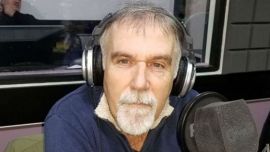A federal court decision to intervene in the country’s central Peronist party, the Justicialist Party (JP), is “an attack on democracy” that seeks to “outlaw Peronism”, the party’s ousted president José Luis Gioja said Wednesday.
There were dramatic scenes Wednesday evening at the JP’s headquarters on Matheu street in Buenos Aires’ Balvanera neighbourhood. Gioja and his colleagues were held up inside the building for several hours as journalists and Peronists of all stripes flocked downtown.
Servini de Cubría’s decision to intervene in the party — effectively replacing Gioja with culinary workers union boss Luis Barrionuevo — has highlighted major cracks in what is, traditionally, the country’s most powerful political party.
“We were not in the trenches. We were working, which is why I’m leaving now because we have finished our work plan for tomorrow”, Gioja said as he left the building, downplaying the short-term implications of the situation.
PERONISTS RESPOND
For the most part, Peronist leaders have responded to the intervention according to their respective relationships, personal and political, with former president Cristina Fernández de Kirchner. Gioja's ousting is seen as a win for both opponents of the former head of state, who is currently a Senator for Buenos Aires province, and for the national government.
“The intervention of the PJ is very sad. The images we saw show the decadence of the party”, said Salta Governor Juan Manuel Urtubey, a likely 2019 presidential candidate who was formerly allied with Cristina Fernández de Kirchner.
“This is an opportunity, having hit rock bottom, for the party to begin to consolidate and serve Argentina. In its current state, it cannot serve”, Urtubey added. “I hope the party begins the path toward normalisation”.
For his part, lawmaker Máximo Kirchner — the son of former presidents Néstor and Cristina — said the intervention proved the government “had no way of guaranteeing an (election) victory in 2019”, suggesting the Macri administration was in some way behind the court’s decision.
Kirchner also made reference to a broad meeting of Peronist leaders in Gualeguaychú, Entre Ríos province last week. The meeting included the participation of Graciela Camaño, a respected national congresswoman alligned to the dissident Peronist Sergio Massa, who is also expected to run for president in 2019. Camaño is Luis Barrionuevo’s wife.
CFK's place in possible electoral alliance continues hindering full Peronist unity
THE ROAD AHEAD
Barrionuevo arrived at the party headquarters Wednesday evening accompanied by Peronists loyal to his faction of the party. The ousted leader, Gioja, had initially refused to abandon the building but eventually departed at 9.30pm local time. “The only thing worse would be for the police to remove me”, Gioja told reporters, responding to Barrionuevo's threats to call the police.
Barrionuevo must now “undertake a stock count of property belonging to the national branch of the Justicialist Party as well as inform (the court) about the economic-financial situation of the entity”, Servini de Cubría’s ruling determined.
Her decision came after a complaint lodged by three union leaders, Guillermo Rojas, Horacio Valdez and Carlos Acuña, who alleged the organisation is mismanaging its finances.
“Siblings of frustrated candidates, members with no political mandate who lost dramatically in national elections, former public officials who could only exercise their position of power in the shadows of a former president (CFK) and whom nobody now recognises”, Acuña said in his presentation to the courts, lodged 24 hours before the judge ordered the intervention.
Macri stronger than ever as troubled Peronists ponder the road ahead
BARRIONUEVO
Luis Barrionuevo is the head of the culinary workers union.
In 2008, he famously told a television programme: “We (politicians) need to stop stealing for two years” in order to improve Argentina’s economic situation. Previously, in 2003 he had called on his supporters to burn ballot boxes in response to unfavourable election results in Catamarca province, an expression that almost cost him his Senate seat.
He among a handful of union kingpins who have open channels of dialogue with the national government.
Read also: Macri, peronismo and the streets

























Comments